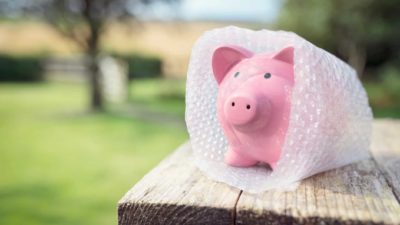The doom and gloom of a potential recession means the temptation to take a defensive position is high. The outlook for the global economy continues to deteriorate as economic growth slows to a crawl. Ratings agency Fitch has predicted world economic growth will slow to 2.5% in 2020, impacted by slowing growth in China and poor manufacturing activity in the United States (US).
Australia has not been immune to the downturn, recording its slowest rate of growth for a decade in the September quarter with economic growth a weak 1.4%. Record low interest rates have so far failed to lift consumer confidence, which fell 5.5% in October to 92.8 points, well below the average of 101.34 points. The unemployment rate in Australia is 5.3% but underemployment is 8.2% and has been growing for 40 years.
What happens if there is a recession?
Australian has not experienced a recession in 28 years. While the Government is determined to avoid seeing one any time soon, there is no doubt that the population is concerned. According to an article in the Australian Financial Review, savings from recent rounds of rate cuts are being used to reduce housing debt, rather than being spent on cars, restaurants, and at retail outlets. This means the expansionary effect of rate cuts is likely to be muted as consumers restrict their spending.
Recessions generally occur when there is a widespread drop in spending. As a result, there is a decline in economic activity and GDP (for at least two consecutive quarters) and usually a spike in unemployment. Companies either slow or stop hiring, cut back on the number of hours offered, or even lay off workers.
Even if jobs are not impacted by a recession, the fear of recession alone can cause consumers to cut back on spending. Purchases of discretionary items are foregone in favour of necessities as people focus on paying down debt and building up emergency funds. Sales of non-essential goods and services decline as consumers favour increasing savings over buying new clothes, electronics or cars.
Is anywhere safe?
Companies in the consumer staples sector are considered recession resistant, as people will continue to buy from them regardless of the state of the economy. Consumer staples are essential products such as food that are in demand year-round, regardless of the business cycle. When an economic downturn is pending, shares in consumer staples businesses can offer a safe haven that generates consistent returns.
Coles Group Ltd (ASX: COL)
Coles operates more than 800 supermarkets, 900 liquor stores, and 700 fuel and convenience stores across Australia. The retailer listed in late 2018 when it split from former parent Wesfarmers, debuting at $12.49. The share price has since climbed to $14.98 and trades on a PE ratio of 18.53. The bulk of Coles revenue (more than 80%) comes from its supermarkets, which command more than 27% of the Australian grocery market.
In FY19 Coles reported sales revenue of $38,175 million, of which $30,992 million came from supermarkets, with $3,204 million from liquor and the remainder from fuel and convenience. Statutory sales revenue growth of 3.2% was recorded for supermarkets and 0.8% for liquor, however this was offset by a decline in fuel volumes.
Sales growth slowed in 1Q20, with sales for supermarkets up by only 1.6% from 1Q19 despite Coles' Little Shop 2 campaign. Own brand sales revenue, however, grew by a robust 4.7% in 1Q20 to with penetration now at 30%.
Earnings before interest and tax (EBIT) were $1,466 million for the group in FY19 with $1,191 coming from supermarkets. Profit after tax increased 5.4% to $1,078 million in FY19, with the Coles Online business achieving profitability for the first time.
FY19 earnings per share were 80.8 cents, up from 76.7 cents for FY18. Shareholders received dividends of 35.5 cents, fully franked. Coles had gross debt of $1,460 million as of 30 June, having drawn down $2,000 million at the time of its demerger and paid the difference back in the interim.
Woolworths Group Ltd (ASX: WOW)
Coles' closest rival, Woolworths commands an even greater share of the Australian grocery market, laying claim to 34%. Woolworths listed back in 1993, in what was at the time Australia's largest ever share float. A staple of the consumer staple sector, Woolworths is responsible for more than 3,000 stores across its supermarkets, liquor, and Big W divisions in Australia and New Zealand.
Woolworths booked sales of $59,984 million in FY19, up 3.4% from FY18 despite an inconsistent start to the year. The Australian food division was responsible for $39,568 million in sales, with $6,291 attributable to New Zealand food. The liquor division contributed $8,657 million, while Big W added $3,797 million and the hotel business $1,671 million.
Disruptions in the first half included the removal of single-use plastic bags and the introduction of collectibles by competitor Coles, however sales recovered in the second half of FY19. EBIT from continuing operations were up 5% from FY18 to $2,724 million. Net profit after tax (NPAT) was $1,752 million, up 7.2% from FY18. Shareholders received a full year dividend of $1.02 per share, fully franked.
Woolworths has continued its momentum into the first quarter of FY20. The Australian food division recorded 7.8% growth in sales for the quarter driven by the Lion King Ooshies and Discovery Garden campaigns. Online sales for the group were up 37.4% in 1Q20, while the liquor division recorded growth in sales of 4.9% for the quarter. Overall group sales were up 7.1% to $15.9 billion in 1Q20.
Net debt was $1,599 million at the end of FY19, up $377 million due to high capital expenditure, an increase in dividend payments, and the timing of New Zealand creditor payments. Shares are currently trading at $37.85, having climbed nearly 30% from $29.15 at the start of the year.
Foolish takeaway
Shares in the consumer staples sector have proven to be a decent bet no matter what stage the economic cycle is at; over the last 3 years the ASX consumer staples index (ASX: XSJ) has returned 43.5%.
Resistant to the economic cycle, in demand in good times and bad, staples are typically one of the last items a household will stop spending on. Consumer staples shares are a classic recession defence.






